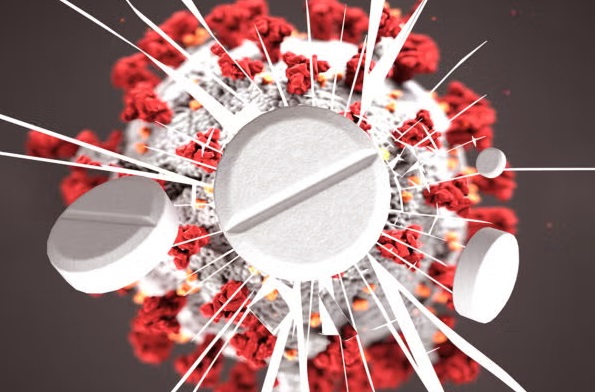Nikhil Prasad Fact checked by:Thailand Medical News Team Jul 24, 2025 7 months, 1 day, 1 hour, 38 minutes ago
Medical News: Promising New Antiviral Breakthrough
A groundbreaking study by researchers from Heinrich-Heine University Düsseldorf, the University of Münster, and Davidson College has led to the development of a new class of antiviral compounds that can strongly block SARS-CoV-2 infection. These new compounds are designed to mimic natural sugars found on human cells, known as sulfated glycosaminoglycans (sGAGs), which the virus uses to latch onto cells.
 New Glycopolymer Based Drug Shows Strong Protection Against COVID-19
New Glycopolymer Based Drug Shows Strong Protection Against COVID-19
However, while sGAGs like heparin are effective at blocking the virus, they also pose serious risks due to their strong blood-thinning (anticoagulant) effects. To solve this problem, the researchers created synthetic mimics using specially designed glycopolymers—manmade sugar-like molecules—engineered to retain high antiviral activity while reducing the risk of bleeding. This
Medical News report highlights that the key lies in adjusting how densely these sugars are packed along the polymer backbone.
How the New Compounds Work
The research team developed a variety of these glycopolymer mimics by tweaking their chain lengths and the number of sulfated sugar units attached. They discovered a “sweet spot” where these polymers were long enough and had just the right number of sugars to stop the virus efficiently, without causing unwanted blood thinning.
Tests using both SARS-CoV-2 pseudoviruses and the actual virus showed that these engineered polymers could effectively prevent the virus from entering human cells. The best performing polymers blocked the virus in a way similar to heparin, but did not cause significant changes in blood clotting times. Importantly, some variants even outperformed natural compounds like carrageenan and heparin in virus-blocking tests.
Why This Matters
Unlike current antiviral drugs that often target the virus itself (which keeps mutating), this approach targets how the virus attaches to human cells—a step that is less likely to change. That makes these new glycopolymer mimics promising candidates for broader, long-term protection, even against future variants of SARS-CoV-2 or other similar viruses. In addition, the researchers showed that changing the structure of these polymers allowed them to lower the anticoagulant effect while keeping the virus-blocking power high.
A Safer Option for Future Treatments
The study's findings provide a strong case for further development of these synthetic glycopolymers as a safer antiviral option. They are customizable, highly effective, and less likely to cause dangerous side effects compared to traditional heparin. With additional testing, these compounds could lead to new therapies for not just COVID-19, but a wide range of viral infections that rely on the same cell attachment mechanism.
The study findings were published in the peer reviewed journal: Biomacromolecules
s.acs.org/doi/10.1021/acs.biomac.5c00576">https://pubs.acs.org/doi/10.1021/acs.biomac.5c00576
For the latest COVID-19 News, keep on logging to Thailand
Medical News.
Read Also:
https://www.thailandmedical.news/news/new-study-shows-alpha-lipoic-acid-may-help-in-fight-against-omicron-variant-of-covid-19
https://www.thailandmedical.news/news/covid-19-accelerates-biological-aging
https://www.thailandmedical.news/news/study-finds-that-blueberry-consumption-significantly-improves-endothelial-function
